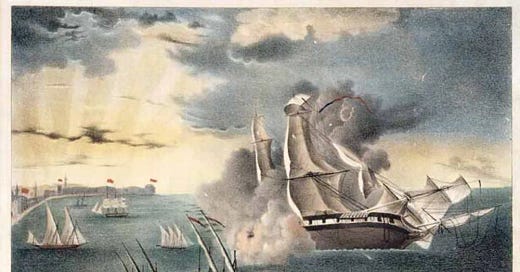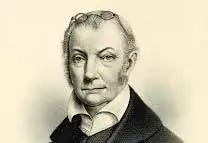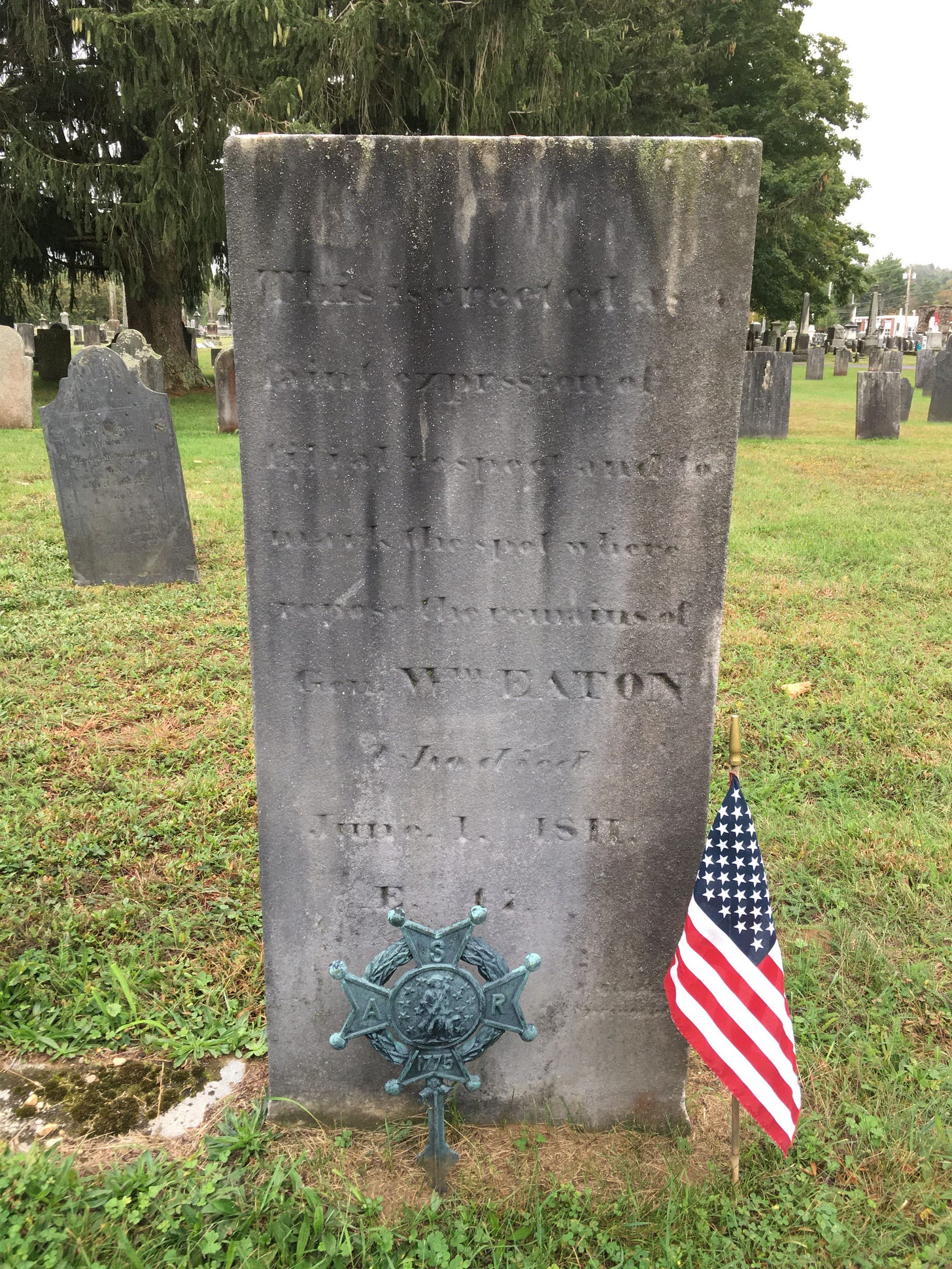Stranger Than Fiction: "America’s Lawrence of Arabia" Was Star Witness In Trial of Alexander Hamilton’s Killer
William Eaton's Last Acts Were A Sad Coda To A Complex But Significant Life (Part 4 of 4)
The USS Philadelphia on the Rocks Off Tripoli in 1803
In previous posts, I related the circumstances behind William Eaton’s breathtaking campaign to overthrow North African Pirate-Bey Yusuf Karamanli and replace him with his ‘kinder, gentler’ brother Ahmed — ‘Hamet’. Eaton’s campaign was thwarted at the last minute — not by the pirates, but by cease and desist orders from Washington, D.C. I then explained how, two hundred years later, in 2011, a US diplomat named Christopher Stevens channeled the spirit of Eaton in the context of the American campaign to remove Libyan dictator Muammar Gaddafi. In this segment I explain the equally implausible second half of the Eaton saga in which Eaton is disgraced by his testimony in the treason trial of Aaron Burr, who killed Alexander Hamilton in a duel in 1805.
Had William Eaton not been so invested in what went wrong in Barbary, he might have enjoyed a lengthy period basking in early America’s adulation at the audacity and courage behind his 1804 “march across the desert”—and made riches off that part of the story. Instead, Eaton chose to expose Washington’s cold calculus, and rail against what he saw as government incompetence. He also complained that the Jefferson administration never paid him back for the out-of-pocket expenses he incurred raising the army that might have won the war.
Aaron Burr
Not long after returning from Barbary, Eaton was allegedly approached by Thomas Jefferson’s former Vice President, Aaron Burr. Burr was the son of the second president of what would become Princeton University, and the grandson of the eminent early American theologian and philosopher Jonathan Edwards.
Burr had heard all about Eaton’s exploits in Libya, and knew of Eaton’s disaffection with the Jefferson administration. Burr thought Eaton was thus perhaps the perfect man to help with a murky operation he was hatching in the American West – which would involve raising an army, just as Eaton had done in Libya.
Burr, a Democrat-Republican, had recently sullied his own reputation by killing Alexander Hamilton -- founding father, author of most of the Federalist Papers, and former Secretary of the Treasury -- in a duel.
The fight was the culmination of bad blood between the two men, which had risen during a “spirited”, two-way 1804 race for Governor of New York, which Burr lost (after losing the Presidency four years previously to Jefferson). [As an aside, and for obvious reasons, Burr would be the villain of the hit Broadway musical Hamilton, dramatizing the latter’s life and accomplishments].
For Burr, the last straw was a newspaper article whose author claims Hamilton is overheard at a dinner party saying that he had a “despicable opinion” of Burr. Burr demanded an apology, which Hamilton refused to give. This led to Burr’s challenge. Hamilton allegedly fired a shot into the air, indicating he would not aim to kill, but Burr shot him in the abdomen.
***
Removed from “polite company,” Burr turned his attention to a scheme that involved raising troops which he might have been planning to use to help drive Spain out of Mexico. Thomas Jefferson accused Burr of treason, after rumors circulated that Burr’s real intent was to set the US Western territories against the Union.
Following Jefferson’s hasty indictment, Eaton was enlisted as star witness for the prosecution. But during the lead-up to the trial in Richmond, Virginia, presided over by America’s most important Chief Justice of the Supreme Court, John Marshall, Eaton sank into drink and was caught cavorting around the pubs of Richmond in “Arab dress”, four sheets to the wind.
When he finally took the stand, Eaton’s testimony was damning to both sides. He could not remember no relevant details about Burr’s approach, nor could he substantiate any of his own claims. As it was revealed that the Government (Jefferson) had settled some of Eaton’s Libya-incurred expenses shortly before the trial, the widespread assumption was that he’d been paid off. Burr would be found ‘not guilty’ of the charge of treason and acquitted of related misdemeanors.
In the wake of the trial, Eaton’s health took a quick dive, in parallel with his drinking problem and financial woes. He died at the age of 47 on June 1, 1811, in Brimfield, Massachusetts – not long enough to see his own predictions come true regarding the cost of leaving the Barbary piracy issue unresolved.
***
In 1815, as the Barbary pirates increased their attacks on American shipping, initiating what would be known as the “Second Barbary War”. Commodore Stephen Decatur, who became famous in the First Barbary War by commanding the Intrepid to destroy the enemy-held USS Philadelphia now led the Attack on Algiers, capturing the flagship of the Algerian fleet, and compelling the Bey of Algiers to submit to a treaty that effectively ended the American wars with Barbary.
Despite being a flawed character – as were Jefferson, and Burr -- Eaton (still) implemented one of the most spectacular acts of valor in American history. The denouement of Eaton’s “march on the desert” illustrates, in a way, how much -- and simultaneously how little -- one man’s efforts can impact the course of history.
Postscript:
Gen. William Eaton’s well-worn tombstone in Brimfield, MA
In 2019, I drove an hour Southwest from Boston to the back-road country town of Brimfield, Massachusetts, today best known as the site of one of the largest American antique shows, to try to locate the grave of William Eaton — which I did, near a large fir tree, in a cemetery much more ample than its Protestant counterpart in Tripoli. The headstone was simple, and of the same dimension as scores of others. The flat inscription concealed the color of the actions for which he should have been, and should be, far better known.
The Middle East-Told Slant offers a non-partisan, practitioner's perspective on Middle East politics, conflict, and culture. Written by a former US diplomat, Senior Middle East Analyst, and author of "Benghazi: A New History" (Hachette, 2022) and the forthcoming "Red Sea: A History of the World's Most Volatile Waterway." To receive weekly posts and support this project, consider becoming a free or paid subscriber. I offer paid subscribers a complimentary copy of any of my books in print (equivalent to the cost of the subscription — DM me to redeem).







This is the kind of writing and reading we need most now. Reflections of how history repeats itself, how we have always been at odds when it comes to foreign policies, how personal political animus ended in a fight to the death.
The more we are reminded, the more we have context in what to expect, a scale by which to judge and different courses we might take to find resolution.
Then there’s personality. In crafting the retelling while including the quirks of personal weakness, you have brought the humanity out in all of us. Giving us the ability to empathize with passions, convictions, justifications of effort, the search for validation and credit where credit is due… these are the hallmarks of good storytelling. When it comes to history, keeping people of all ages engaged is the goal.
Thanks for another informative essay Ethan! I was interested to learn about Eaton's connection to the Burr saga. On the topic of visiting graves, in Fall 2023, I finally visited Burr's in Princeton, along with that of Grover Cleveland, who at the time was the only president to serve non-consecutive terms.